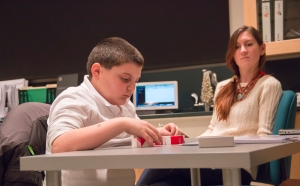Whitney Hoffmann, psychology graduate student, runs through a demonstration of a vocabulary test with Vinnie Apicella, 9, of East Haven. Southern’s Psychology Department has been performing autism research, centered around language difficulties, at one of their labs in Engleman Hall. Photo Credit: Derek Torrellas
Aaron Berkowitz – General Assignment Reporter
A team of SCSU professors and graduate students have come together with Haskins Laboratories, which is affiliated with both Yale and University of Connecticut, to conduct research on whether or not the avoidance of eye contact, which has been associated with autism, results in other common speech difficulties or language development problems.
According to Dr. Julia Irwin, the study is executed through a method of eye tracking, which monitors exactly where the children, who are being tested, are looking on someone’s face while they’re speaking.
“Essentially,” said Irwin, “we are measuring underlying electrical activity in the brain while they are watching the speaking faces.”
Irwin said her team aims to find the underlying cause of what the delays in speech and language could possibly be. The second part to the team’s research has come through their use of a therapeutic training game on an iPad called “Listening to Faces,” which was designed to help the children being examined to better understand speech, noise, and improve their overall ability to communicate.
A big part of this research’s distinctiveness comes from the collaboration of the university’s various departments. Barbara Cook, assistant professor of communication disorders and expert in autism said she believes working together will make all of the difference in the success of the research and testing.
“This has been a very positive and rewarding experience from a few fronts,” said Cook. “Working with students from communication disorders and psychology has been eye opening to me as a professor because I have gotten to see their level of knowledge while they gain more experience. In addition, their enthusiasm sparks enthusiasm in me. I think it’s helping the students realize the importance of collaborating because it really makes our research more complete.”
Irwin mentioned that their testing focuses on children from 6-12 years old because they already have language developed and have shown more of a tolerance to wearing the nodes that they attach to their heads for testing. Irwin also said they targeted that specific age group so that if they find markers in their brains they can then go back to do a study on children who are even younger than 6 years old, before they are able to speak, to see if they can intervene earlier through their testing.
She also described the change she has seen in the children they have tested and said they “warm up” after undergoing the testing processes.

“I think kids have varying levels of understanding,” said Irwin. “Coming into the testing some of the children can be apprehensive, but one of the things we do here in the lab at Southern is allow them to play with toys to feel more comfortable. If they’re not comfortable or don’t want to engage then essentially there is no science.”
Cook said she has many aspirations for the tests they are running and that the future could hold the possibility of testing other age groups to compare to the results they collect.
“Right now we are focusing on individuals with autism that are verbal, but it would be interesting to see if we would be able to support individuals who are less verbal and compare those results to our current tests results,” said Cook. “It might be a little more complex to do some of the tests that we are running now, but it’s still early on anyways and we don’t want to get ahead of ourselves.”
Cook also said they are still looking for participants in the study. They are looking for children between the ages of 6-12 and participants will be rewarded with $10 per hour. Parents interested in having their children tested can contact either Dr. Irwin or Cook, as well as project coordinator Jacqueline Turcios, an SCSU graduate student, at listeningtofaces@haskins.yale.edu to see if they are eligible.
Photo Credit: Derek Torrellas






































































































